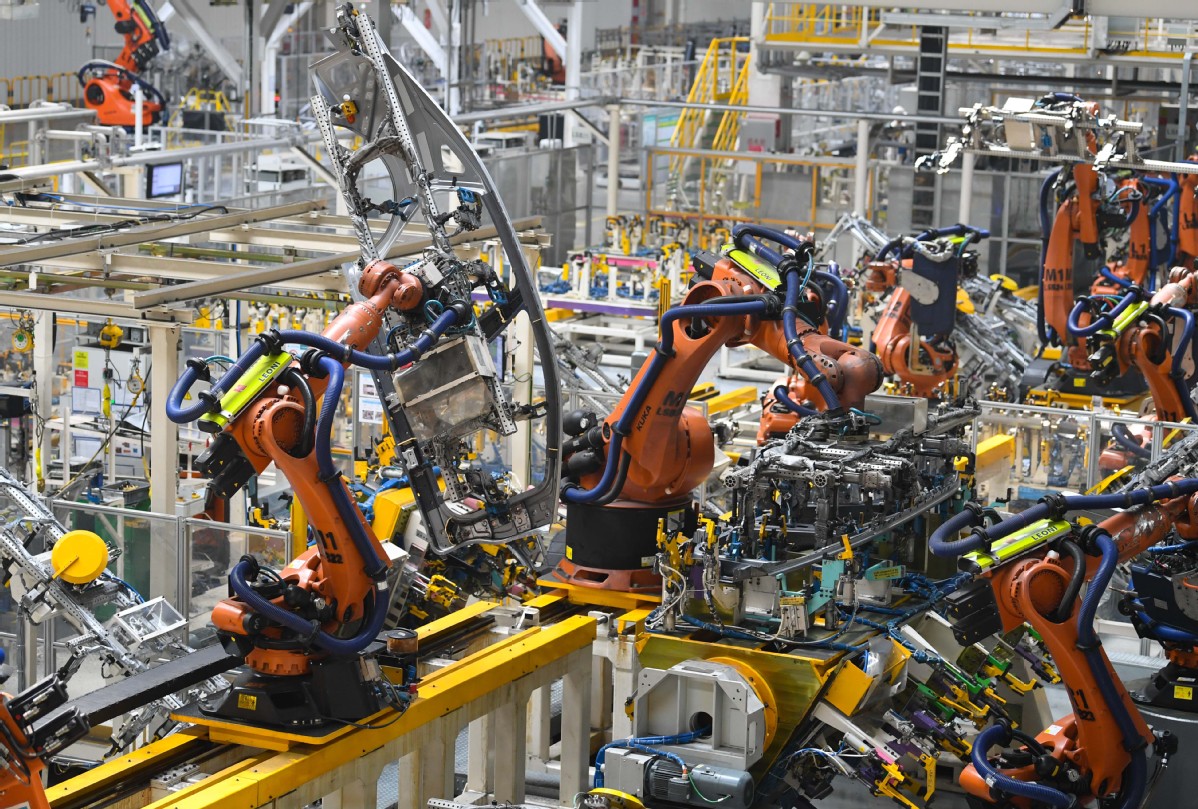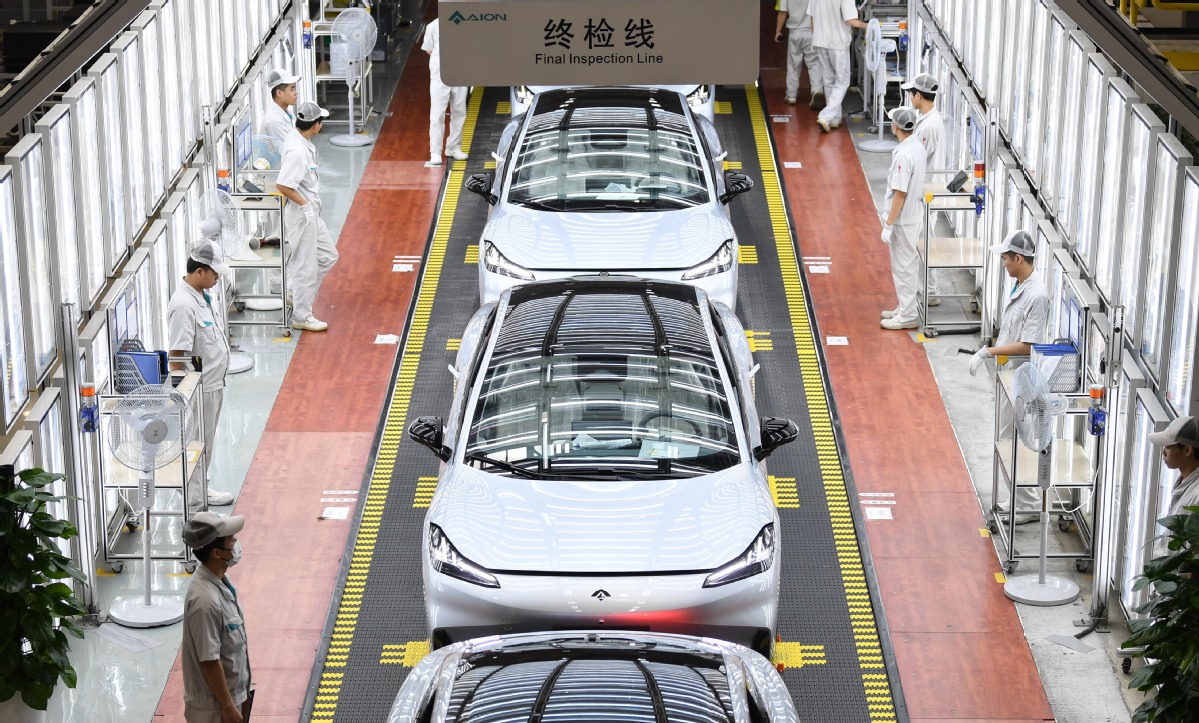China powers global NEV manufacturing
China Daily | Updated: 2023-11-17 10:02

Foreign automakers benefiting from big plants in Hefei, Shanghai
BEIJING - In an automotive factory spanning an area equivalent to 16 soccer fields in Hefei, capital of East China's Anhui province, more than 800 robots work collaboratively to assemble six different models of new energy vehicles.
The megafactory is part of Volkswagen's new NEV production facility, designed to address the swiftly increasing demand in the country amid formidable local competition.
While Chinese electric vehicle manufacturers and suppliers made a strong presence at the bustling showrooms of this year's International Motor Show in Munich, Germany, VW reiterated its commitment to establishing a localized supply chain in the Chinese market.
The German auto giant will forge ahead with an "in China, for China "strategy with homegrown partners, VW CEO Oliver Blume said at the show.
The global market for NEVs is exploding, with multiple Chinese manufacturers along the industrial chain emerging as star enterprises.
The real story behind the prosperous EV sector is more vibrant than China's ascent in the sector. Technology, capital and markets around the world, including China, are merging to form a larger industrial landscape that benefits countries transitioning to eco-friendly transportation.

Dynamic market
Volkswagen Group has recently completed the acquisition of a 4.99 percent stake in Chinese EV startup Xpeng to co-develop electric cars. Rather than pursuing a "Chinese-market-for-foreign-technology "approach in the era of traditional fuel vehicles, Xpeng has leveraged its proprietary expertise in NEV software.
Through a strategic partnership deal, VW acquired Xpeng's smart cockpit and advanced driving assistance technology. The two companies will jointly develop two B-class battery EV models for sale in the Chinese market under the VW brand, with production expected to start in 2026, Xpeng said.
"We will share smart EV technologies and world-class design and engineering capabilities with each other and learn from each other," said He Xiaopeng, chairman and CEO of Xpeng.
"In an intensely competitive and dynamic market environment, we are leveraging the partners' core competencies, thus creating synergies to bring additional products to market faster," said Ralf Brandstatter, Volkswagen AG board member for China.
Adjacent to VW's factory in Hefei, an industrial park is being constructed to accommodate an increasing number of its upstream suppliers. This includes a battery plant jointly built with Chinese battery cell manufacturer Gotion High-tech.
Volkswagen has made investments in Hefei-based Gotion High-tech to integrate local suppliers into the company's global supply network, said Erwin Gabardi, CEO of Volkswagen Anhui.
BMW, another German automaker, has also swung into action to take advantage of China's strengths in the NEV upstream chain. It has signed a long-term agreement with leading EV battery maker Contemporary Amperex Technology Co Ltd, to purchase cylindrical cells starting in 2025 for its new EV models.
Toyota Motor and Chinese NEV giant BYD have vowed to establish a joint company to conduct research and development.
ZF Friedrichshafen AG, a leading Germany-based auto parts maker, announced in June that it planned to open a new plant in Shenyang, Northeast China's Liaoning province, to manufacture electric axle drives.
"The groundbreaking for the new project demonstrates ZF Group's ongoing investments and innovation in China," said Stephan von Schuckmann, who is a member of ZF Group's management team.
In September, Tesla Gigafactory Shanghai, the automaker's first gigafactory outside the United States, celebrated a significant milestone as its 2 millionth vehicle rolled off the assembly line, achieving its second million vehicles in less than 13 months.
Tesla Gigafactory Shanghai has localized more than 95 percent of its parts, with 99.99 percent of employees being Chinese. Moreover, over 50 percent of the EVs Tesla delivered globally in the first half came from the Shanghai plant.
The NEV industry scale at Lingang Special Area in Shanghai, which is home to many Tesla suppliers, is expected to reach 300 billion yuan ($41.3 billion) in 2025, growing into a globally influential NEV hub, Tesla China said.
"Many Chinese component suppliers are deeply plugged into Tesla's global chain and have earned acclaim from other international car brands," said Song Gang, senior director of manufacturing at Tesla Gigafactory Shanghai.
The two-way technical cooperation bolstered by the strengthening innovation capacity of Chinese manufacturers has "provided homegrown and foreign enterprises equal chances to benefit", said Cui Dongshu, secretary-general of the China Passenger Car Association.
Going 'glocal'
The flourishing global NEV market has become a major playground for quality and affordable electric vehicles made in China. But instead of only selling finished commodities overseas, Chinese companies are increasingly inclined to expand their production capacity and create job opportunities abroad.
Ningbo Xusheng Group, a Chinese supplier of components for Tesla, plans to replicate its industrial chain in Mexico to produce aluminum alloy auto parts after Tesla founder and CEO Elon Musk decided to build a new Tesla factory near Monterrey in northeastern Mexico.
JL Mag Rare-Earth, a Chinese manufacturer of magnets used in electric vehicles, is contemplating the construction of a recycling facility in Monterrey, taking a cue from Tesla's initiative.
China's battery manufacturers are pursuing a dual-strategy approach - transforming China into the global hub for EV production and establishing "glocal" bases in potential markets. These companies are swift in disseminating technology and job opportunities worldwide in response to demand, thereby reinforcing a more resilient global supply chain.
Gotion High-tech plans to set up a state-of-the-art EV lithium battery plant in Illinois in the United States.
"When we come to Illinois, we are not building a new factory, but planning to reuse an existing one and bring it back to life again," said Li Zhen, chairman and CEO of Gotion High-tech.
The new facility is "a game-changer in our state's economy", said Juliana Stratton, lieutenant governor of the state.
"With 2,600 new jobs, a 2-billion-dollar gigafactory, and the most significant new manufacturing investment in Illinois in decades, it's the most recent proof that we are in a new paradigm," said Illinois Governor JB Pritzker.
The decision to set up the battery plant followed the battery manufacturer's announcement last year of a plan to construct a 523-acre (212-hectare) facility for EV battery components in the heart of Michigan in the United States, with the aim of generating 2,350 jobs in the coming decade.
In 2021, Gotion High-tech announced a strategic cooperation agreement with Volkswagen for the construction of a battery cell factory in Salzgitter, Germany, which is scheduled to start production in 2025.
"I firmly believe this will be a successful model of Sino-European trade and economic cooperation, as well as the global new energy strategy," Li said.
On the morning of Sept 16, Gotion's first battery production and operation base in Europe rolled out its first locally produced battery product in Gottingen, a university town in central Germany.
Peter Willemsen, Gotion Global's COO, said the spirit of cooperation between China and Europe is important in efforts to "make Europe green again".
Eve Energy, another prominent Chinese lithium-ion battery manufacturer, plans to establish an EV battery production facility in Debrecen, Hungary. The city has also been selected as the location for a giant battery factory to be constructed by CATL, the world's largest EV battery manufacturer.
Eve, the ninth largest EV battery maker worldwide, will invest around $1.2 billion in the project and aims to create over 1,000 new jobs, said Peter Szijjarto, the country's minister of foreign affairs and trade.
China's battery producers are also tapping potential in emerging markets. CATL and Gotion High-Tech tied up with Vietnamese automaker VinFast, known as "Vietnam's Tesla", to support its ambition to manufacture cars.
Last November, Gotion High-tech and VinFast started construction of a lithium iron phosphate battery plant in Ha Tinh province, Vietnam, to meet VinFast's increasing demand for EV parts.
In addition to advancing battery technology development, CATL is ready to collaborate with VinFast to promote battery innovation and the e-mobility transition.
Technology transfers are also occurring across the Pacific. Eve is poised to build a new R&D facility in Ohio, the US, with a specific focus on testing, design and storage of lithium-ion batteries.
Eve's proprietary energy storage techniques can support the full life cycle of such batteries, which in some cases are 10 to 20 years, according to JobsOhio, a US co-founder of the facility.
By investing in Ohio, visionary companies like Eve Energy North America are able to advance research on how to best store and improve lithium-ion batteries for the future, said JobsOhio President JP Nauseef.
XINHUA
























